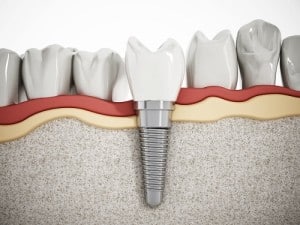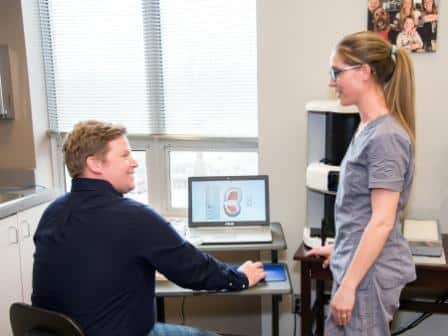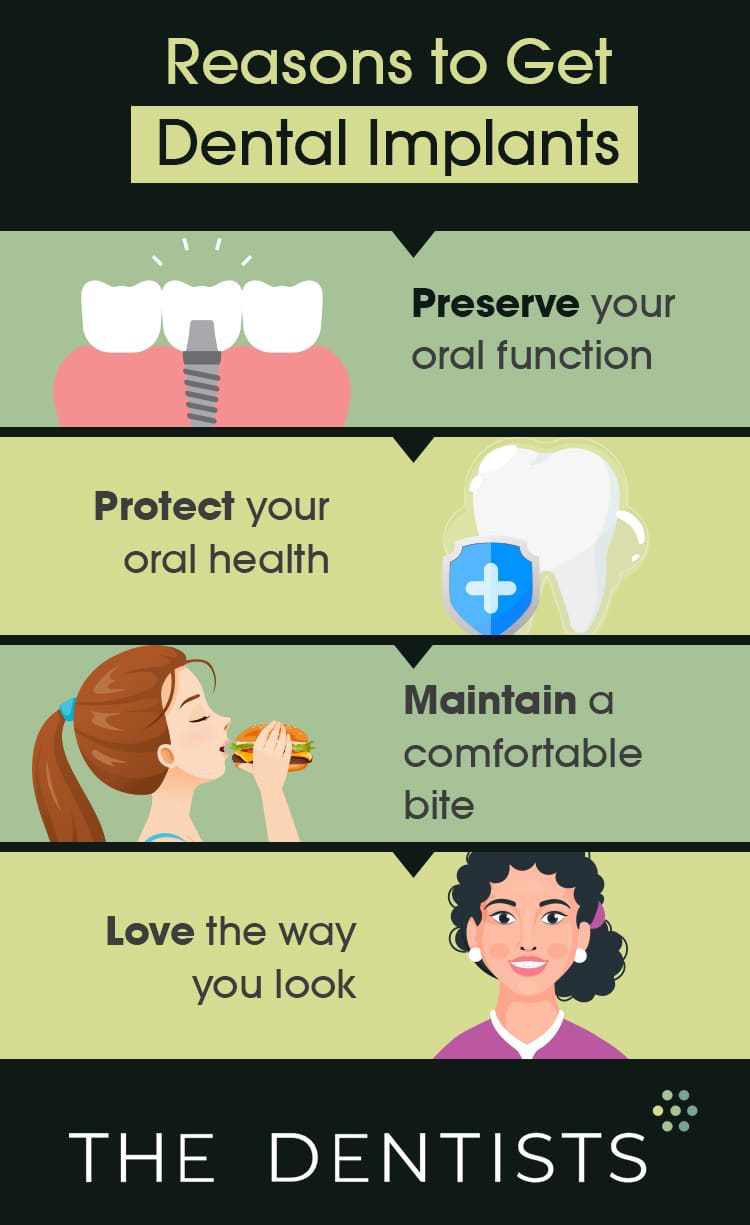General & Cosmetic Dentists Serving Omaha, Bellevue, Lincoln and Nearby Nebraska
Missing teeth is a common dental problem among American adults. Gum disease, hard foods and injury are just some of the reasons you may have lost a tooth. For single or multiple missing teeth, dental implants are often the ideal option.
Want to find out if you are a good candidate? Please contact our experienced implant dentists in Omaha at Hillsborough: 402-445-4647, Village Pointe: 402-505-7474, Ralston Square: 402-733-4441, or Dundee: 402-502-5593 today.
What Does a Dental Implant Do?
A dental implant replaces the entire structure of a missing tooth – root and crown. They are surgically implanted within the bony ridge beneath the site of missing teeth. The implant itself is made of durable titanium.
The replacement of the visible portion of the tooth is called the restoration. The restoration may be a tooth crown, dental bridge or denture, each of which can be attached to a dental implant.

Are Dental Implants painful to install?
There are several reasons we have been named Omaha Magazine's "Best Family Dentist" for 14 years straight. All of the services we provide are performed with the patient as our central focus. For those who visit us for dental implants, we make the process as streamlined, stress-free, and painless as possible. We do so first by communicating clearly and openly with our patients regarding their dental issues and proposed treatment plan. We take time to answer questions and listen to concerns.
Understanding that getting dental implants can be unnerving to most patients, our team works meticulously through these appointments to make the procedure as comfortable as possible. During the consultation for dental implant treatment, a patient may determine that they would be most comfortable getting this treatment if we used oral conscious sedation or twilight IV sedation. With or without sedation, our dental implant procedures are performed using a local anesthetic that numbs the area we are treating. Patients can expect to feel pressure, similar to when they get a filling, but should not find their dental implant procedure painful.
Mini Dental Implants
These dental implants have a smaller diameter than other implants. They are a miniaturized version of the traditional dental implant and are used to stabilize a denture. Placed in strategic spots within the jaw, they support a denture, which is affixed to the top of the implants with attachments.
One of the advantages of miniaturized dental implants is that the procedure to place them and the dentures is relatively fast and simple. It is most often completed with the patient under local anesthetic, which results in a much easier, faster recovery. Your discomfort afterward should be minimal.
Ask our dentists if you are a good candidate for these restorations. Some people are better candidates for conventional implant dentistry.
Dental Implant Candidates
Not everyone is a good match for dental implants, but many people are. Rely on our experienced dentists to determine if they are an option for you. We want you to enjoy the absolute best results, and we will make sure you know each and every tooth replacement option available to you. Here are some of the things that indicate good candidacy:
- Interested in a long-term, durable tooth replacement
- In good general health
- Healthy gum tissue free of gum disease
- Adequate bone beneath your teeth

The only way to know for sure is to visit our dentists. They will examine your teeth and mouth, discuss your health history and discuss what it’s like to have a dental implant. X-rays will be taken and assessed as well. It’s important to make sure a dental implant will be right for you. There are other options for teeth replacement, all of which our dentists will discuss with you.
How are the Dental Implants Installed?
The dental implant procedure takes place in our comfortable office. Before beginning, the dentist checks in with the patient and answers any last-minute questions.
If the patient has chosen to receive oral sedation, they will have taken their medication before arriving at the office. This type of sedation calms the nervous system but allows the patient to remain awake and able to communicate well with our staff.
If the patient has chosen to receive IV sedation, the procedure will begin with the administration of their sedative. This medication typically acts quickly to create mild drowsiness and a calm, relaxed state. Close monitoring ensures that the patient continually receives the right amount of sedative throughout their procedure.
Treatment is always performed with a local anesthetic. After the injected medication has numbed the surgical area of the mouth, the dentist makes a tiny incision in the gums to access the jawbone where the titanium metal implant post will be placed.
A small drill-like instrument creates an opening in the jawbone just large enough to accommodate the post. After the post has been inserted, the incision in the gums is closed with a stitch. The gums cover the implant post completely so it is undisturbed during its time of healing when bone tissue grows around it.
Patients who receive sedation for their dental implant procedure must arrange to have a loved one accompany them to their appointment, as it is unsafe to drive until the sedative has worn off completely.
What are the Advantages of Dental Implants?
People love the advantages of dental implants:
- Replace the missing tooth root, as well as the visible crown
- Tend to be the longest-lasting teeth replacements
- Look like real teeth
- Easy to clean and care for
- Conveniently fixed within your mouth, so you don’t have to worry about removal
- Replace one, several or all of the teeth
The resiliency and durability of implant dentistry is due to the fact that the titanium post is implanted within the bone beneath your teeth. The implantation forms a solid, stable fusing of bone tissue and implant. The bone will hold the implant securely in place, and the implant stimulates the bone.
Without replacement of the tooth root, the bone beneath the missing tooth begins to shrink and deteriorate. The deterioration can even affect the shape of your lower face, creating a shrunken or collapsed appearance to the lower jaw. Dental implants prevent this from occurring because they stimulate the bone.
What are the reasons to Replace Missing Teeth?
If you are missing one or more teeth, there is good reason to replace them. It’s important to feel confident about your smile and the appearance of your teeth, which may be reason enough to replace the teeth. But there are other reasons as well:
- Prevents remaining teeth from drifting and tilting toward the gap left by the missing tooth
- Restores optimal ability to chew and speak
- Maintains a comfortable bite position
- Prevents tooth wear caused by an uneven bite

Patient Testimonial
"My wife and I started coming here a few years ago after bad experiences with other dentists. We have nothing but fantastic care and a great friendly atmosphere. They genuinely care about you and your family my wife loves Dr. Demman and so do I."
How to Maintain Healthy Gums after Getting Dental Implants
Gum health is essential to the life of your dental implants. It isn’t difficult to take care of the gums. The best suggestions are to brush (two full minutes, twice a day), floss, and see the dentist every six months. The problem with gum health is that over 80% of people just don’t floss. To maintain healthy gums, you may need to set a timer or write yourself a note that you’ll see each time you brush. You may need to do this for several weeks until flossing becomes an ingrained habit. As a supplement, not an alternative, you may also use a water irrigator to flush away debris that may get loosened but not removed by your floss. If you have questions about your gum health or notice signs of inflammation like bleeding when you brush, talk to your dentist about how you might improve your oral care routine.
How to Maintain and Care for Implants after Installation
Maintaining dental implants is easy. The habits that are recommended to keep your teeth and gums healthy are the same habits that will help your oral health thrive with dental implants. Insufficient oral hygiene is the primary issue that can cause dental implant failure, so you should brush and floss as recommended by your dentist and, if you have questions or concerns, schedule a visit right away. Long-term dental implant use may also be affected by bruxism. This is a condition in which a person clenches their jaw or grinds their teeth. Bruxism most commonly occurs at night when a person sleeps, so it can be difficult to identify if you do it. If your jaw or teeth ache in the mornings when you wake up, you may clench or grind. Talk to your dentist about a custom-made mouthguard that you can wear when you sleep. This comfortable appliance can mitigate the force of bruxism and preserve the integrity of your dental implants as well as their restorations.
What is the recovery process like after getting Implants?
It is normal for patients to experience mild to moderate discomfort after the anesthetic from their procedure wears off. Over-the-counter medication like ibuprofen can manage this side effect very well when taken as directed. It can be beneficial to begin taking a pain reliever before it seems necessary. Doing so can prevent pain from becoming distracting. Mild swelling and bleeding may also occur in the first 24 hours after getting dental implants. Following your post-treatment care instructions can help these side effects resolve quickly. If bleeding persists beyond 24 hours, contact our office for further instructions. One of the critical aspects of dental implant recovery is ensuring that the implant post is not disrupted. Though secured beneath the gums, it is necessary to avoid too much pressure and friction on the implant while bone growth is ongoing. For the first few days after implant surgery, it is best to eat softer foods that don’t require a lot of chewing. Hot and spicy foods should also be avoided until the gums have healed. Your dentist’s post-operative care instructions may discuss how you should brush and floss during the first days of implant surgery recovery. It is generally appropriate to brush using a soft-bristled toothbrush and nonabrasive toothpaste, but care should be taken when rinsing the mouth. The day following the procedure, care instructions may include beginning salt-water rinses a few times a day. If you have questions during your dental implant recovery, do not hesitate to contact our office.
How long Dental Implants can last
Dental implants are a popular treatment option because they hold the potential for lifelong function. As long as oral health is well-maintained over time and periodontal disease does not develop, there is little concern about dental implants failing.
Can Dental Implants be removed?
The vast majority of dental implant procedures result in long-term, satisfactory outcomes. However, complications are possible. If an implant fails, it needs to be removed. Failure may occur due to infection or lack of osseointegration, meaning that the bone tissue did not fuse to the implant. When possible, the dentist will replace the implant with a new titanium post.
Schedule a Client Consultation!
Our dentists will help you restore your smile and dental health with the right tooth replacement. To arrange a consultation in Omaha, please call our experienced staff at Hillsborough: 402-445-4647, Village Pointe: 402-505-7474, Ralston Square: 402-733-4441, or Dundee: 402-502-5593. The Dentists has offices in Hillsborough, Ralston, Village Pointe and Dundee, and we serve patients in nearby Bellevue, Lincoln and the surrounding areas.